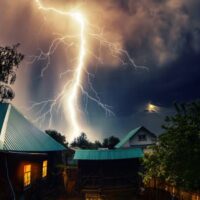What is an Act of God?

The construction industry can be complicated due to the processes and terminology involved. One thing that is common in construction contracts is mention of an “act of God.” An act of God typically refers to an unforeseeable event that is beyond the control of the parties involved in a construction project. Acts of God are primarily nature-related events, such as hurricanes and fires. This term is also used in the insurance industry.
An act of God can cause a lot of damage to a construction project. It may disrupt the project schedule, cause damage to the worksite or materials, and lead to financial losses for the parties involved. Contracts in the construction industry often include clauses that address how acts of God will be handled, including provisions for extensions of time, adjustments to project schedules, and allocation of costs related to the event.
As a general contractor, it is important for your construction contracts to clearly define what constitutes an act of God and outline the procedures for addressing such events. At the very least, your contract should allow for non-performance in the event an act of God makes completing the contract impossible. A well-written contract can minimize disputes and ensure that the parties can effectively manage the impact of unforeseen circumstances on the project.
Examples of Acts of God
Acts of God are nature events that may include the following:
- The ground shaking can cause widespread damage to buildings and infrastructure.
- Hurricanes, typhoons, and cyclones. Hurricanes are especially common in Florida. These are powerful tropical storms characterized by strong winds, heavy rainfall, and storm surges.
- These are violently rotating columns of air extending from thunderstorms to the ground, causing destruction to buildings and vehicles.
- An overflow of water caused by heavy rainfall can cause property damage.
- These are large ocean waves typically generated by underwater earthquakes, volcanic eruptions, or landslides, causing widespread destruction along coastal communities.
- Uncontrolled fires that spread rapidly through vegetation, forests, and grasslands can burn down houses and other structures.
- Lightning strikes. Electrical discharge from thunderstorms can cause fires, structural damage, and injury or death to humans and animals.
Construction contracts should include force majeure as well. This is slightly different from acts of God. While acts of God are nature-related, force majeure includes both acts of nature and extraordinary circumstances due to human intervention. Force majeure may include an outbreak of a contagious disease (such as COVID), government lockdowns, or war.
Contact Us Today
Whether or not you are religious, as a construction professional, your contracts should outline what will happen when acts of God occur. A weather event can occur at any time, making it difficult or even impossible to meet the deadlines outlined in your contract.
Contractors have legal rights. A Florida construction contract lawyer from Linkhorst Law Firm, P.A. can inform you of the important things that need to be included in your contract. Schedule a consultation by filling out the online form or calling 561-626-8880.
Source:
law.cornell.edu/wex/act_of_god#:~:text=Contracts%20frequently%20include%20an%20act,makes%20completing%20the%20contract%20impossible
